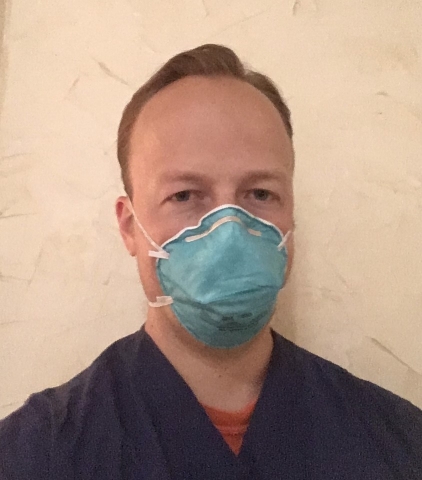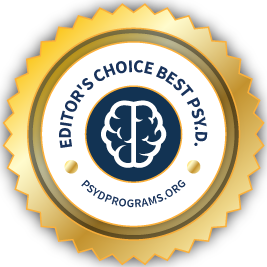Life on the front lines has never been more trying for those working in the healthcare profession. They truly are heroes, and we're so proud to spotlight our very own Dr. John McLaughlin, M.D., '08, an ophthalmologist at Horizon Eye Care and Shore Medical Center in New Jersey, who shared his experience and reflected on what it's been like working and living during the pandemic.
by John McLaughlin, M.D., '08
I am a graduate of the Class of 2008, and I majored in biology at Chestnut Hill College. 
Currently, I am an ophthalmologist at Horizon Eye Care and Shore Medical Center in Somers Point, New Jersey. I've been there one year, after finishing my residency at Sinai Hospital in Baltimore, Maryland.
I work four days a week, performing eye exams in our six clinics all along the Jersey Shore, and I operate one day a week at our surgery center in Margate, New Jersey. The operations I perform are cataract extractions, LASIK/PRK, glaucoma stents, lesion excisions, and blepharoplasty. I also cover calls for ocular emergencies at Shore Medical Center. As a result of COVID-19, I have been working less hours as the pandemic put a stop to all nonessential surgeries across the country, which significantly limited our ability to operate as usual.
Our surgery center has been closed for two months and is just now starting to reopen. All nonessential medical exams also stopped during this time, so for that two-month period I was only working two days a week in the clinic, seeing emergency patients only. We are just getting back to full-time services now. We are one of the few clinics in our area still functioning at this time because many of the local eye doctors are older and worried about their safety, so our volume of traumas and emergency patients have increased significantly.
We have a screening process for people coming to the clinic. I have only seen known COVID-positive patients through telemedicine. There have been a few case reports of the virus causing conjunctivitis. I have seen an uptick of conjunctivitis patients on telemedicine whom I suspect could be COVID-19-related but unable to verify.
I am fortunate that the vast majority of my duties are outside of the hospital at this time. If this had happened at any point in the previous five years, my experiences in my internship and residency would have had me exposed much more. The most unnerving aspects for me now are if I am called into the emergency room for a trauma because I know our hospital has confirmed cases. I am very mindful about wearing PPE when I enter the hospital or clinic.
My emotions about the virus fluctuate day to day. I gain confidence and feel safer when I read about the high percentage of asymptomatic infections, but then I also keep in touch with colleagues from medical school and residency who share stories of young and healthy people having serious complications. I gain hope that things will improve with time, but unfortunately it seems like we have a long way to go until things are completely back to normal.
I worry most about the people I come in to contact with as well as my family and my patients. We try to take every possible precaution at work. We all wear masks. We screen all patients coming into the clinic with a COVID review of systems and then again with temperature checks at the door. We have our patients wait in their cars until their exam room is prepared. We have installed protective shields at the front desk and in exam rooms. The number of patients we are able to see, compared to a few months ago, have decreased dramatically to ensure safe social distancing measures.
I am looking forward to getting back to “normal” when all of this is over. It will be nice when we can return to the beach and boardwalk here! The ability of the virus to spread outdoors appears to be much less when compared to indoor spaces, so I hope we can safely resume outdoor activities very soon. I am also looking forward to seeing family and friends, but I think this will have to be something that is slowly incorporated back into our lives, and I don't envision an official day where we can open the flood gates on all activities.
I think the best advice I can give to my fellow Griffins is to always use common sense and do everything possible to stay safe until we know more. Wear a mask when you are around other people and continue frequent hand washing. Unfortunately, I don't think there are any experts on the virus at this time. The leading health organizations and infectious disease authorities around the world have had a very difficult time making consistent and accurate predictions about the virus. The recommendations and predictions change daily, and I think it will be a while before we really understand the behavior of the virus and how to effectively treat it and prevent rebounds.
I worry most about the long-lasting effect of lost jobs and small businesses. I also worry about people with mental health and substance abuse issues continuing to be isolated at home. I don’t think isolation at home is a safe long-term solution. I think going forward we will have to embrace protective measures like masks and limit unnecessary social gatherings so that we can find the right balance between reducing the spread of the virus and safely returning to work to prevent further economic turmoil.
Lastly, I want to thank everyone at Chestnut Hill College for helping me to achieve my goals in medicine. Dr. Kulkosky and the biology department did a great job of preparing me for medical school, and I cherish the time I was able to spend at CHC.







